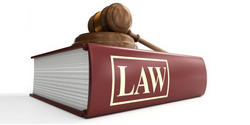Copy of `Glossary Central - Legal glossary`
The wordlist doesn't exist anymore, or, the website doesn't exist anymore. On this page you can find a copy of the original information. The information may have been taken offline because it is outdated.
|
|
|
Glossary Central - Legal glossary
Category: Legal
Date & country: 31/05/2011, USA
Words: 227
|
willA legal instrument directing the disposition of a person's estate, the handling of a person's affairs, and the appointment of an executor for the estate and/or a guardian for dependents after a person's death A will must follow certain procedures to be valid.
attorney-client privilegeGenerally, all communications between an attorney and their client are privileged, that is they are entirely confidential, being given special protection under the law, and no one else (particularly their opponents in a lawsuit) are entitled to gain access to them. This is referred to as the Attorney-Client Privilege. Also, most documents produced by an attorney and his staff in regard to the clie...
asbestosAsbestos is a naturally occurring mineral that can only be recognized with a microscope. Asbestos is generally used in acoustical insulation, fireproofing, roofing and flooring. Inhalation of asbestos fibers can critically damage a person's health. Exposure to asbestos can lead to asbestosis, which is a scarring of the lungs.
witnessSomeone who may be called to testify, either at deposition or at trial, regarding what they observed, their knowledge of the facts.
willful negligenceIntentional performance of an unreasonable act in disregard of a known risk, making it highly probable that harm will be caused. Willful negligence usually involves a conscious indifference to the consequences. There is no clear distinction between willful negligence and gross negligence.
arbitrationA method of alternative dispute resolution in which the disputing parties agree to abide by the decision of an arbitrator.
asbestosisSee asbestos.
appealRequest to a superior or higher court to review and change the result in a case decided by an inferior or lower court or administrative agency.
arraignmentA proceeding in which an individual who is accused of committing a crime is brought into court, told of the charges, and asked to plead guilty or not guilty. Sometimes called a preliminary hearing or initial appearance.
waiver of immunityA means authorized by statute by which a witness, before testifying or producing evidence, may relinquish the right to refuse to testify against himself or herself, thereby making it possible for his or her testimony to be used against him or her in future proceedings.
allegationThe claim made in a pleading by a party to an action setting out what he or she expects to prove.
alimonyFinancial payments made to help support a spouse or former spouse during separation or following divorce. Also called spousal support or spousal maintenance.
amicus curiae(Latin: "friend of the court.") Person or organization that files a legal brief with the court expressing its views on a case involving other parties because it has a strong interest in the subject matter of the action.
alternative dispute resolutionSettling a dispute without a full, formal trial. Methods include mediation, conciliation, arbitration, and settlement, among others.
affiantA person who makes and signs an affidavit.
agreementMutual assent between two or more parties; normally leads to a contract; may be verbal or written.
affidavitA written statement of facts confirmed by the oath of the party making it, before a notary or officer having authority to administer oaths. For example, in criminal cases, affidavits are often used by police officers seeking to convince courts to grant a warrant to make an arrest or a search. In civil cases, affidavits of witnesses are often used to support motions for summary judgment.
adjudicationGiving or pronouncing a judgment or decree. Also the judgment given.
addictionA physiological and psychological compulsion for a habit-forming substance. In extreme cases, an addiction may become an overwhelming obsession, which may cause injuries or even death.
adulteryThis term refers to sexual intercourse by a married person outside of the marriage. In some areas this may also be grounds for divorce or adversely affect the offender's case.
adrSee alternative dispute resolution.
absolute liabilityLiability regardless of fault.
abrasionA scrape, minimal bleeding with possible intense pain.
actionIn the legal sense, a formal complaint or a suit brought in court.
accidentAn unfortunate and undesired event. It results in loss, damage or personal injury. Collision, injury to any person, loss of life, disablement and material damage or expenses that innocent parties have to pay when it was not their fault, can be an occurrence of an accident.
visitationThe time that a noncustodial parent spends with his or her child(ren).
warrantMost commonly, a court order authorizing law enforcement officers to make an arrest or conduct a search. An affidavit seeking a warrant must establish probable cause by detailing the facts upon which the request is based.

